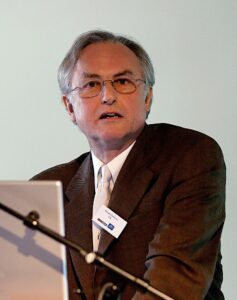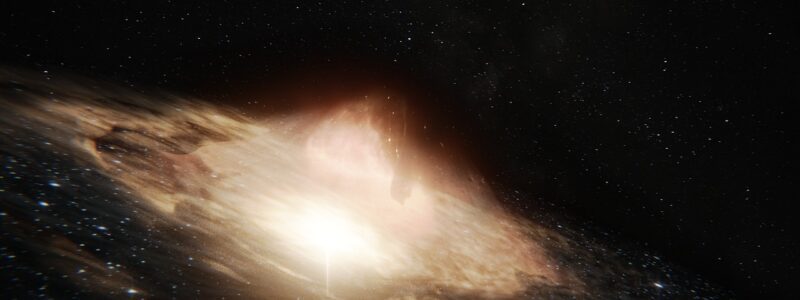Atheism and the Meaning of Life
What is the meaning of life to an atheist? Richard Dawkins chimed in on this topic when he opined as to whether life has any meaning at all. In his book, The God Delusion, he noted,
If the universe were just electrons and selfish genes, meaningless tragedies … are exactly what we should expect, along with equally meaningless good fortune. Such a universe we observe has precisely the properties we should expect if there is, at bottom, no design, no purpose, no evil and no good.
Possibly the most well-known paleontologist in the world Stephen Jay Gould of Harvard University opined,
We are here because one odd group of fishes had peculiar fin anatomy that could transform into legs for terrestrial creatures; because comets struck the earth and wiped out dinosaurs, thereby giving mammals a chance no otherwise available (so thank your lucky stars in a literal sense) because the earth never literally froze entirely during an ice age; because a small and tenuous species arising in Africa, a quarter of a million years ago, has managed so far to survive by hook and by crook. We may yearn for a higher answer – but none exists. This answer though superficially troubling, if not terrifying, is ultimately liberating and exhilarating. We cannot read the meaning of life passively in the facts of nature. We must construct these answers ourselves – from our own wisdom and ethical sense. There is no other way.
Another atheist thinker, David Benatar, who is a professor of philosophy at the University of Cape Town, wrote a book entitled, The Human Predicament: A Candid Guide to Life’s Biggest Questions.” In this book, he agrees with Dawkins and Gould that life is meaningless. We are here due to the mindless processes of evolution with no intrinsic purpose. He notes that “life is terrible, and some people are unluckier than others.”
The Existential Horror of Being Alive
Woody Allen is another controversial atheist who promulgates the atheist worldview through his movies. In one of his more popular movies, Play it Again, Sam, Allen plays the role of a divorcee looking to pick up women. He wanders into a museum of modern art and approaches a young lady and asked her about her opinion of a Jackson Pollock painting with random drippings,
Allen: “What do you see in this?”
Woman: “It reinstates the negativeness of existence. Nothingness. The hideous lonely emptiness of the universe. The predicament of man forced to live in a godless, barren eternity like a tiny flame flickering in an immense void with nothing but waste, horror, and degradation, forming a useless bleak straight jacket in a black absurd cosmos.
Allen (Nodding in agreement as he looks at the painting): “What are you doing Saturday night?”
Woman: “Committing suicide.”:
Allen: “Well, what are you doing Friday night?”
In an interview with Newsweek, Allen notes, “I still like awake at night terrified of the void.” He admits, “I make movies not to make any type of grand statement but simply to take my mind off the existential horror of being alive.”
This is the natural consequence of atheist philosophy. Life has no purpose; we are here solely by chance and when we die we slip into nothingness.
The bleak reality is that one day, it is all going to end with nothing to show for our life. People will soon forget you ever lived, your story will be forgotten, and everything you worked for will end in despair.
Atheism and Free Will

Image by Ichigo121212 from Pixabay
Probably the oddest conclusion of the new atheists is that there is no free will. While atheists like to think they are defenders of “rationality” and “science” against the “superstitions” of religion, they have some truly odd beliefs.
These odd beliefs arise naturally out of their atheist philosophy but do not seem to be supported by common experience.
In recent years, several of the “New Atheists” such as Richard Dawkins, Sam Harris, and the late Christopher Hitchens have made fortunes writing popular books extolling their atheist philosophy.
It is the common experience of most people that they have free will. If you want to go to bed early tonight, you go to bed early and exercise your free will over how you spend your time. It would seem like we make decisions throughout the day and then act on these decisions making our own free choices.
This is precisely why we are free moral agents and can be held responsible for our actions. This is why we have a court system; people have free will and have chosen their free will to commit a crime. Otherwise, if people are not free moral agents and have no free will, then they cannot be responsible for anything they do. Therefore, the jails should be emptied and criminals let loose on society because they are unjustly jailed since they are not responsible for the crimes they have committed.
For example, Sam Harris, one of the New Atheists, insists free will is illusory. Harris sees no need to accept free will to keep criminals in jail noting,
We need not have any illusions that a causal agent lives within the human mind to recognize that certain people are dangerous.
Where intentions themselves come from, and what determines their character in every instance, remains perfectly mysterious in subjective terms. … the idea that we, as conscious beings, are deeply responsible for the character of our mental lives and subsequent behavior is simply impossible to map onto reality.”
Richard Dawkins opined,
I have a materialist view of the world. I think that things are determined rationally by antecedent events and that commits me to the view that when I think I have free will, then I think I am exercising free choice I am deluding myself. My brain states are determined by physical events.
William Provine in a debate with a theist at Stanford University noted,
Free will is not hard to give up, because it’s a horribly destructive idea to our society. Free will is what we use as an excuse to treat people like pieces of crap when they do something wrong in our society. We say to the person, ‘you did something wrong out of your free will, and therefore we have the justification for revenge all over your behind. We put people in prison, turning them into lousier individuals than they ever were. This horrible system is based upon this idea of free will.
Francis Crick, one of the co-discoverer of the structure of DNA, noted,
You, your joys and your sorrows, your memories and your ambitions, your sense of personal identity and free will, are in fact no more than the behavior of a vast assembly of nerve cells and their associated molecules. Who you are is nothing but a pack of neurons.
Criminals still need to be isolated from potential victims because the criminals are “dangerous,” even if their criminal activities are not due to their free will. Harris further argues our world would be a much better place if we would only accept that free will does not exist,
Once we recognize that even the most terrifying predators are, in a very real sense, unlucky to be who they are, the logic of hating (as opposed to fearing) them begins to unravel.
In Harris’ deterministic viewpoint, criminals do crime because it is a manifestation of who they are and not their freely determined activity. All these atheists believe that the free will that makes us morally responsible for our actions and future commitments is purely an invention of Christian theology. Certainly, we are not responsible agents for our actions who can be punished for our misdeeds.
Is Lack of Free Will (Determinism) a Good Thing?

Prisoning people for what they have done is immoral with determinism.
Harris states that if only enough people believed people did bad things because their crimes are just a manifestation of who they are, society would be better.
But this belief is not supported by scientific study. Researches from the University of Minnesota and the University of British Columbia decided to determine whether determinism is a good societal belief. they found that,
students who were exposed to deterministic literature prior to taking a test were more likely to cheat on the test than students who were not exposed to literature advocating Determinism. The researchers concluded those who deny free will are more inclined to believe their efforts to act morally are futile and are, therefore, less likely to do so.
This fascinating scientific research suggests that believing your behavior is not your responsibility relieves people from moral constraints. Why not cheat on a test or commit certain crimes if the result of this activity will provide some intended benefit? My cheating on a test is not my moral responsibility but only a manifestation of who I am.
In other words, the logical result of a deterministic belief system is that I can do anything I want because anything I do is not really my responsibility. My criminal behavior is only a manifestation of who I am.
Why Atheists Deny Free Will

Richard Dawkins – By Matthias Asgeirsson from Iceland – Richard Dawkins on Flickr, CC BY-SA 2.0, Link
Atheists are caught in a bit of a conundrum concerning the concept of apparent free will. It is the common experience of most people that they have responsibility for their actions. We teach this to our children very early in life; they are taught not to beat up their younger siblings or they will be punished in some fashion. Whether this punishment is with a “time-out” or corporeal punishment, parents want their children to know they are responsible for their actions.
But the atheist is in a bind because to them, the material world is all there is. If that is the case, then everything must have a materialistic explanation. Human free will defies such an explanation and therefore if people really do make their own decisions atheism cannot be true. This is the case because your free will decisions would be something “more than” just matter. If you can really make choices independent of your neurochemicals, then decisions can not be explained by a naturalistic “cause and effect” chain of chemical reactions.
Most importantly, if there is an independent “you” inside your body that freely chooses to do something or not do something, then the materialist understanding of the Universe is false. Or as Sam Harris noted,
You will do whatever it is you do, and it is meaningless to assert that you could have done otherwise.
Oh, But The Irony
Of course, none of these authors really behave as though there was no free will. For example, Sam Harris writes in an acknowledgment section,
I would like to thank my wife and editor, Annaka Harris, for her contributions to Free will. As is always the case, her insights and recommendations greatly improved the book. I don’t know how she manages to raise our daughter, work on her own projects, and still have time to edit my books – but she does. I am extremely lucky and grateful to have her in my corner.
Those are nice sentiments and I am sure his wife was appreciative. But since his wife has no free will, she didn’t really choose to help Sam. It was just thrust upon her (somehow) by the nature of the Cosmos. Why thank a person who works so hard to keep your household running when it was not her decision to edit your book at all, but the unalterable course of cause-and-effect actions motivated by neurochemical reactions in her brain!
The ultimate irony is these New Atheists give debates on college campuses with theists and try to convince the audience that there is no free will. The fact that these students came to listen to a philosophical debate on free will rather than have fun with their buddies was determined by their neurochemicals and not by their decision-making capacity. But why have a debate in the first place? Those who believe in God are driven by their genes to do so while those who believe there is no God are equally products of their neurochemical reactions. If humans can not change their minds, but, as Harris claims, their minds change them, then why try to change believers’ minds since they don’t really have “minds” and their brains are going to “believe” whatever it is their neurochemical tell them.
No Hope for Rehabilitation of Criminals
Another logical manifestation of determinism (or lack of free will) is that it is futile to attempt the rehabilitation of a criminal. Rehabilitation implies a willingness to change; with determinism, criminals are unable to change.
Atheists try to frame the idea that people are not responsible for their actions. As Cashmore noted,
From this simple analysis, surely it follows that individuals cannot logically be held responsible for their behavior.
Atheists who deny free will try to make up a world in which no moral responsibility brings about (somehow) a modern utopia, nothing could be further from the truth. The rapist blames his genes and can prey upon women to his heart’s content knowing he is not responsible for his actions.
Similarly, the worst atrocities in human history are not the responsibility of any belief system or any person but were destined to be by the neurochemistry of those responsible for the atrocity. Hitler was no more responsible for the slaughtering of millions of people as Mother Teresa is responsible for feeding the sick and dying in Calcutta.
The denial of moral responsibility is one of the most dangerous ideas ever to come out of atheists but is the natural outcome of their philosophy. Criminals would be let out of prison with the hope their neurochemistry will guide them to better choices. It is the experience of humanity throughout history this is not the case.
Finally, the lack of responsibility for our poor moral choices means we do not have to feel guilty about these choices. If you decide to kill somebody, it is just a natural outpouring of your biological mandates – nothing to feel guilty about. You are, after all, just a mindless robot.
Of course, Scripture says differently. Scripture is very clear we are responsible for our actions.
For we must all appear before the judgment seat of Christ, that each one may receive the things done in the body, according to what he has done, whether good or bad. (2 Corinthians 5:10).
Summary to the Meaning of Life
For the atheist, there is no meaning to life. We are born, live our lives with our decisions preordained for us by our neurochemicals, and die. All our accomplishments (or misdeeds) will soon vanish from collective thought and we will be forgotten by the winds of history.
The atheist must believe we have no intrinsic free will, and that we are really not responsible for any of our actions. Prisons and court systems with their retribution and rehabilitative justice are all evil because they assume people can be changed. They can’t.
If this all seems counterintuitive, it is. We teach our children to be responsible; not to beat up their smaller siblings, not to steal, not to do bad things to others. But why not! There is no moral accountability after all. Is it not a part of evolution that the weak must be vanquished by the strong?
Thankfully there is still a whisper of Christian morality in our common society but it is disappearing fast. The fact that these assertions by the New Atheists are given any credence at all seems very frightening because they lead ultimately to a bad place. We have been there before – at the crematoria of Germany and the killing fields of Cambodia.
Let’s no go there again.




